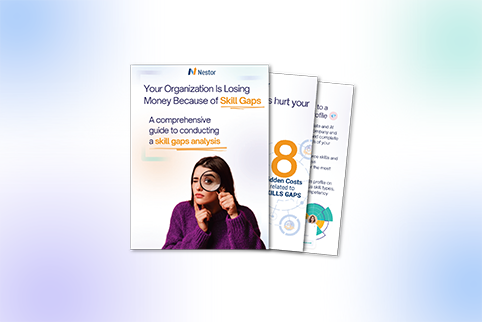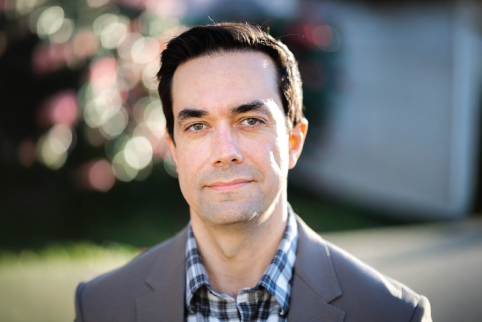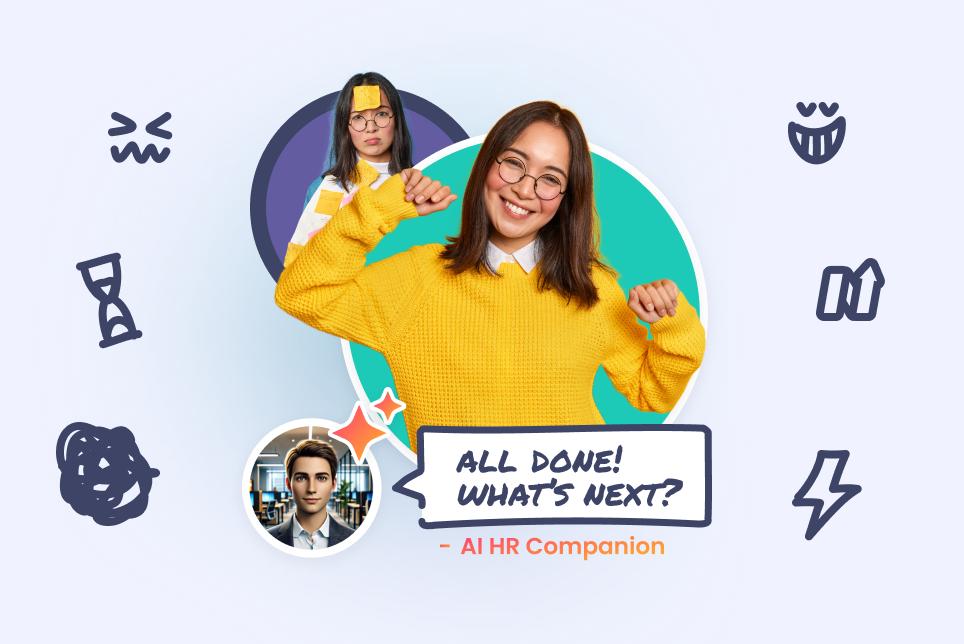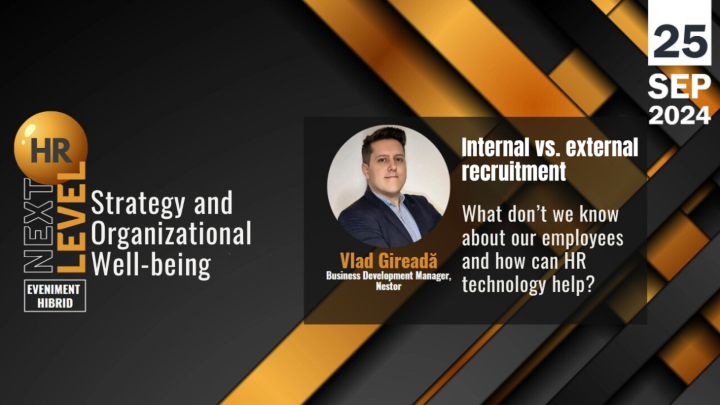HR Skills in the Age of AI: Building Skills and Career Paths for the Future
Fill in to continue watching
In our session, featuring Dr. Dieter Veldsman, Chief HR Scientist at the Academy to Innovate HR and hosted by our Business Development Manager Vlad Mircea Gireadă, the shifting field of human resources (HR) in the era of AI and shifts in work settings became the main focus. Dr. Veldsman, renowned for his expertise in the future of work and HR transformation, shared insights into the challenges and opportunities awaiting HR professionals.
Dr. Dieter Veldsman is a distinguished leader in organizational psychology and strategic HR with over 15 years of impactful contributions. Currently serving as Chief HR Scientist at the Academy to Innovate HR (AIHR), Dr. Veldsman leads initiatives to empower and educate 100,000 HR professionals by 2025. He fosters dialogue and innovation through his videocast series, “The HR Dialogues,” and collaborates on impactful research projects aimed at driving positive change within the HR community and beyond.
In our webinar, he began by emphasizing the critical role HR professionals play in today’s complex workplaces. He highlighted his passion for transforming HR roles and developing essential competencies needed in the near future. Structured around three main pillars, Dr. Veldsman’s presentation covered: understanding the future of work, adapting to new HR roles, and developing necessary skill sets.
Generative AI was a significant topic, showcasing its role in automating HR tasks and enhancing decision-making processes in recruitment and performance management. Ethical considerations such as data privacy and algorithmic bias, alongside concerns about job displacement were highlighted during this discussion.
The session challenged traditional HR career paths, urging professionals to explore diverse roles and prioritize continuous learning and adaptability. It was also emphasized HR’s strategic role in driving organizational success through data-driven decision-making, digital transformation, and ethical leadership. The role of HR in fostering diversity, equity, and inclusion, alongside promoting sustainable work practices was also examined.
The Shifting Paradigm of Work
The concept of work-life balance is undergoing a revolutionary transformation. Today’s professionals are increasingly gravitating towards what experts call “work-life fit” – a more sophisticated approach that emphasizes autonomy and flexibility in seamlessly integrating work into one’s personal life. This trend, catalyzed by recent global events, has far-reaching implications for HR departments worldwide:
- Flexible work arrangements are becoming the norm rather than the exception.
- Career decisions are increasingly influenced by personal factors such as delayed family planning and individual ambitions.
- HR strategies must evolve to accommodate diverse life stages and aspirations within the workforce.
This shift represents a fundamental change in how we perceive and structure work. It’s not just about finding balance, but about creating harmony between professional and personal lives. For HR professionals, this means:
- Developing policies that support flexible working hours and remote work options.
- Creating a culture that values output and results over traditional metrics like hours spent in the office.
- Offering personalized benefits packages that cater to individual needs and life stages.
- Implementing technology solutions that facilitate seamless communication and collaboration across distributed teams.
If you think about it, a lot of our work model is still based on the second industrial revolution where work was tied to a time, to a place, to people being at the same place at the same time for work to be able to happen. And that's no longer true.
— Dr. Dieter Veldsman

The AI Revolution in HR
Artificial Intelligence is no longer a futuristic concept but a present reality that is fundamentally reshaping HR practices. Its impact is being felt across various aspects of human resource management:
- Automation of Routine Tasks: AI is streamlining administrative processes, from candidate screening to interview scheduling and employee feedback analysis.
- Enhanced Decision-Making: AI-driven tools are improving the accuracy and efficiency of HR decisions, particularly in areas like skill matching and talent acquisition.
- Ethical Considerations: As AI becomes more prevalent, issues of data privacy, algorithmic bias, and ethical decision-making are coming to the forefront.
However, as noted by Dr. Dieter Veldsman, AI adoption in HR is not without its challenges:
- Job Displacement Concerns: There’s anxiety about AI replacing traditional HR roles, emphasizing the need for reskilling and upskilling.
- Cultural Adaptation: Organizations must navigate the cultural shifts required for widespread acceptance of AI in HR processes.
The first starting point there is for HR professionals, is to start deep diving a little bit more into a digital mindset, being more open to experimentation. And if I may say it bluntly being willing to fail from time to time to really learn and shift yourself to be able to get there into the future as well.
— Dr. Dieter Veldsman

Diverse Career Paths in HR
Dr. Dieter Veldsman challenged traditional notions of HR career progression, advocating for a more dynamic and diverse approach:
- Cross-Functional Mobility: HR professionals are encouraged to explore roles both within and outside of HR to broaden their skill sets and perspectives.
- Non-Linear Progression: Career advancement may involve lateral moves or even temporary steps back to gain diverse experiences.
- Personalized Success Metrics: Defining career success based on individual aspirations rather than traditional benchmarks.
But I think the first interesting finding, and this was a study of more than 3 million HR professionals, 92% of HR professionals don't start their careers within HR. So for most people in HR today, their very first job actually was in something else, in some different function or in some different format.
— Dr. Dieter Veldsman

Continuous Learning: The New Career Constant
In a rapidly evolving work environment, continuous learning is non-negotiable:
- Technological Proficiency: Staying updated on the latest HR technologies and their applications.
- Data Analysis Skills: Developing the ability to interpret and act on data-driven insights.
- Adaptability: Cultivating a mindset that embraces change and new challenges.
The session emphasized that many organizations are falling short in providing adequate reskilling opportunities for HR professionals.
I firmly believe that one of the most crucial skills for success in your career in the future is curiosity, how curious are you about what's happening in the world and what's happening around you and how do you take those lessons to heart and keep on learning continuously and reinventing yourself.
— Dr. Dieter Veldsman

HR as a Strategic Partner
The role of HR is evolving from a support function to a key driver of organizational strategy:
- Change Management: HR is increasingly responsible for guiding organizations through digital transformations and cultural shifts.
- Innovation in Talent Management: Developing new approaches to attract, retain, and develop talent in a competitive landscape.
- Ethical Leadership: Championing ethical practices and employee well-being as core organizational values.
HR has to play a key role to help guide organizations to be able to figure that out, to think about reskilling, upskilling people and transitioning and really just to play this different role than what we are playing today.
— Dr. Dieter Veldsman

Navigating Public Perceptions of AI
Dr. Dieter Veldsman addressed the evolving public perception of AI in the workplace:
- Addressing Concerns: While fears of AI “going rogue” haven’t materialized, public apprehension remains.
- Responsible Adoption: Organizations are urged to experiment with AI technologies cautiously, balancing potential benefits with associated risks.
- Transparency: Clear communication about AI’s role and limitations is crucial for building trust.
There's still a lot of fear out there. A very interesting study was just released that spoke about if consumers do actually trust brands if they know that they are engaging with AI and not with real human people.
— Dr. Dieter Veldsman









